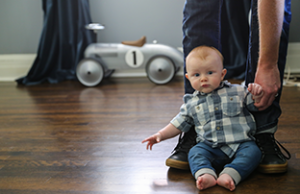When building your home, you can choose from thousands of flooring options, and it can get overwhelming. The factors to consider are aesthetics, durability, health, environmental impact, and future resale value. Carpet and rugs are popular and can be responsibly purchased and installed, but they are not the most eco-friendly flooring options. It is important to choose a sustainable flooring material that will last a lifetime, offer the highest resale value, and provide health benefits for your family.
There are sustainable flooring options, like hardwood, that you can choose to make an eco-conscious choice when building your home!
What are the Types of Flooring?
When choosing flooring, it’s important to consider each material’s environmental impact. Many popular flooring alternatives are not environmentally friendly.
- Carpet: Are typically made from synthetic fibers and can release volatile organic compounds (VOCs) and are difficult to recycle. Dirt, allergens, and dust get trapped in carpets, and it’s very hard to get a good deep clean.
- Vinyl: Produces significant environmental pollutants during its manufacturing and is not biodegradable. Also, vinyl off-gases contain phthalate chemicals that can migrate into your home’s dust and produce toxic chemicals when burned
- Laminate: is the most wood-like in its appearance, but it can contain plastics and other non-renewable resources that contribute to landfill waste. It’s not moisture-proof, hard to repair, or noise-proof.
What Flooring Material has the Highest Resale Value?
Hardwood is one specific flooring material that has consistently increased resale value over the decades. According to USA TODAY, hardwood flooring professionals believe that using hardwood flooring in your home can increase its resale value by 2+ times. Homebuyers are willing to pay a premium for hardwood because it is durable, looks timeless, can be refinished multiple times, is easy to clean, and is a sustainable choice that will last a lifetime.
What Flooring Materials are the Best for Kids?
For families with children, the type of flooring used in your home is important for health benefits. Babies and toddlers spend a lot of time on the floor, crawling and playing, coming inside and outside, and they often put their hands and toys in their mouths.
Hardwood flooring is the preferred choice for families with little children due to its:
- Cleanliness: Hardwood is very easy to clean and considered hypoallergenic.
- Sustainability: Hardwood is durable, lasts a lifetime, and has a smaller ecological footprint than other alternative flooring options. When hardwood is manufactured, the only chemical used is a binding resin with strict OSHA and EPA regulations. These regulations ensure hardwood floors emit fewer chemical toxins into the air.
- Health: The U.S. Environmental Protection Agency (EPA) confirms that homes with hardwood floors have better indoor air quality than homes with other types of alternative flooring.

Real American Hardwood stated that real hard hardwood floors, cabinets, and furniture directly affect your mood, stress levels, and overall mental health.
Indoor environments have a direct affect on your mood, stress levels, and overall health. Research shows that nature and wood products can provide a mental boost. That’s why many homeowners bring nature indoors with #RealAmericanHardwood cabinets, millwork, furniture, and floors. pic.twitter.com/Pr3Jn8NB9I
— Real American Hardwood (@RealAmericanHwd) June 28, 2024
What are Sustainable Flooring Materials?
There are sustainable, eco-friendly flooring options that can reduce indoor pollution and prevent potential health issues.
Solid Hardwood Floors:
FSC-certified hardwood is the most sustainable flooring option for your home. Many hardwood types come from FSC-certified forests. These forests are responsibly managed, where trees naturally regenerate, biodiversity is conserved, and air and water quality are preserved. Hardwood floors are durable, eco-friendly, and last a lifetime.
What is the most Eco-Friendly Flooring?
Hardwood is the most environmentally friendly flooring choice. By choosing Gutchess Lumber’s hardwood for your home, you can ensure lumber comes from sustainably managed forests. We have 11 hardwood species to choose from, and they are native to the northeast United States. We can control the process from harvest to order fulfillment while keeping our operations sustainable by only harvesting within 150 miles of our seven New York and Pennsylvania locations.
By using hardwood flooring, you can help to mitigate climate change. Scientists at Yale forecasted unhealthy forest composition changes caused by insects and diseases over the next 100 years, which active forest management can help to reduce.
What makes Flooring Sustainable?
Important factors to think about that make flooring sustainable when you are choosing your flooring for your home are:
- Material Type: Use renewable or recycled materials, like hardwood, to benefit the environment.
- Manufacturing Process: Do your research and make sure the manufacturing process is environmentally friendly and reduces emissions and waste.
- Longevity of the Material: Materials like hardwood and tile are durable and sustainable and do not require frequent replacement or repair.
If you’re asking yourself, ‘Which flooring material should I choose for my home?’ if you are a homeowner, you should consider hardwood, an eco-friendly and sustainable option. By choosing hardwood, you are taking a step towards a greener future. Hardwood is the most sustainable option, and it can provide a beautiful, long-lasting floor while contributing positively to the environment and your family’s health.

